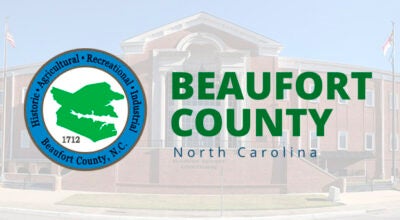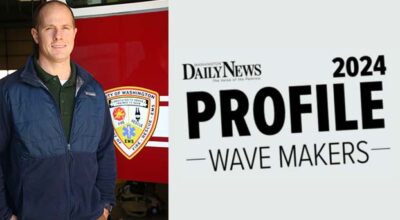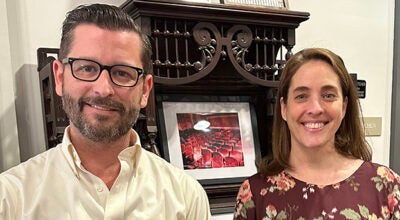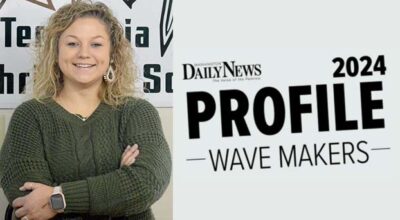Candidates discuss voter ID
Published 7:54 pm Thursday, October 23, 2014
Candidates seeking to represent Beaufort County in the North Carolina General Assembly discussed their views on the state’s current voter ID requirements during a forum last week at Beaufort County Community College.
The forum was presented by the Beaufort County Democratic Party and the Beaufort County Republican Party last week at Beaufort County Community College. The forum featured candidates for state Senate District 1, state House District 6 and state House District 3. They included incumbent state Sen. Bill Cook, a Republican representing Senate District 1; incumbent state Rep. Michael Speciale, a Republican representing House District 3; Whit Whitley, the Democrat challenging Speciale; incumbent state Rep. Paul Tine, a Democrat representing House District 3; and Mattie Lawson, the Republican challenging Tine. Democrat Stan White, who is challenging Cook, did not attend because he had a previous commitment to attend another forum in District 1.
“Seventy-three percent of the North Carolina voters want a photo ID. It’s very popular with our voters. They understand the need for it. They don’t want their vote cancelled out by someone who is not legitimate and cannot vote. This is a popular vote. It’s easy to get a voter ID. You can’t get a library card without a photo ID. It’s silly to think it’s discriminating. It’s a weak argument. North Carolinians understand better than that. It doesn’t take effect until 2016. We’ve got plenty of time to gear up for it. I believe it is a good and fair law, and I support it,” Lawson said.
Speciale has a special interest in the voter ID laws.
“I’ve been on the elections committee and I helped put the bill together. I support it. I fully support it. When you walk in to vote, how crazy is it nobody has any idea who you are? …. I listened to one (poll) judge that worked at the poll that said a guy came in, gave a name, voted, left, came back a little while later, voted, left again, came back again and gave a third name and there was nothing he (the judge) could do about it,” Speciale said. “Of course, we asked him ‘How do you know it was the same guy?’ Because he had a scar across his face and he had on this really weird-looking yellow shirt, so he was not someone you could mistake. Three times he came in and there was nothing they could do about. There’s something they can do about it now.”
Speciale said the contention that 600,000 people would be “disenfranchised” in the voting process is “baloney” and a “red herring.”
Tine said he voted for the original voter ID bill in the state House.
“It was a reasonable bill. I (had) an amendment on that bill. It had a large number of IDs that you could bring. We do have access issues to DMV in Hyde and Washington counties, two of the counties I represent. … It went over to the Senate. Those things were stripped out and the number of IDs was reduced. Several other provisions were added that were more restrictive. My roommate (in Raleigh when the Legislature is in session) is actually a Republican. He calls it the Democrats Can’t Vote bill after it comes back from the Senate,” Tine said. “I voted against the bill when it came back. Voter ID is brandished about as a very simple idea of just showing up at the polls, but the plan that we implement is important. … If you’re going to feel more secure about your vote by having an ID, then fine. Let’s do it. Let’s put it to bed. Let’s make it reasonable. … It’s ridiculous that we have counties where you can’t even go and get an ID today. That’s something we’ve got to fix, too.”
Whitley said he believes in photo IDs for voters.
“Evidence indicates that in other states it actually increases turnout. I think that our democracy works when everybody can vote. We shouldn’t put in any unnecessary or tough restrictions. I believe that neither party, Democrat or Republican, should gain power and then do anything to target any specific group. I don’t believe in that. If there’s any evidence that’s happened, that’s going to be decided in federal court,” Whitley said. “I disagree with some part of the bill, specifically making it more difficult to be registered coming out of high school … eliminating Sunday voting. I think a specific group typically votes on Sunday.”
Cook said he supports the voter ID requirements.
“I think it’s a great idea. I often give people the analogy that maybe you don’t have any crime in your neighborhood, but I bet you most of you lock your doors at night. It’s a prudent thing to do, and it’s the same kind of thing with voter ID. I believe there’s a lot of fraud in voting. Even if there isn’t fraud in voting, it’s a prudent thing to do — to have a voter ID when you go to vote. It makes sure than when you vote, your vote counts fully, because if somebody else votes fraudulently, that reduces your impact on the election. That’s unfair and un-American.”
Cook said voter IDs should be issued by a governmental entity. “You can get such an ID now. It’s free.”






